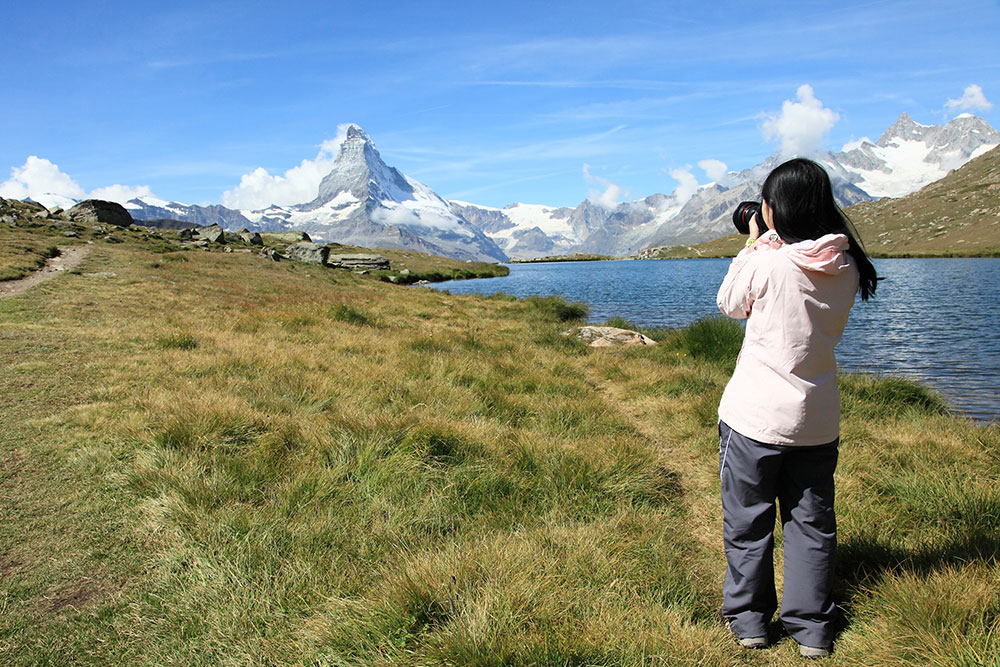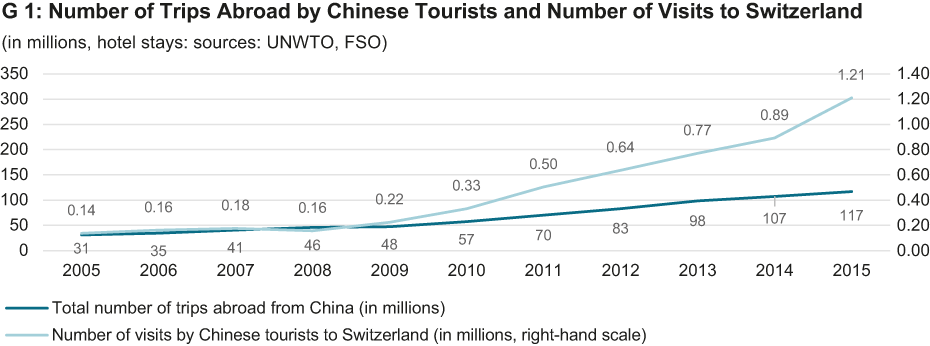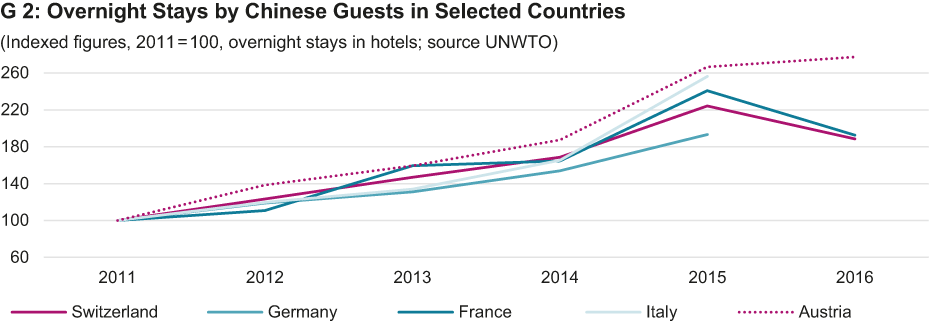The Increasing Significance of Chinese Visitors for Swiss Tourism
- KOF Tourism Forecast
- KOF Bulletin
Boom in Chinese tourism. The country has become the most important market of origin for the international tourism sector in terms of spending by tourists. Chinese visitors are also becoming increasingly important for the Swiss tourist regions, a trend which is also expected to continue into the coming months, as is shown by the most recent KOF Tourism Forecast commissioned by the SECO.

Strong economic growth in China over recent decades has led to a veritable boom in the tourism sector, which has been supported by the country’s opening up towards international markets, improved flight connections and the easing travel restrictions. The number of outgoing tourists from China 1 increased over the ten-year period from 2005 to 2015 from 31 million to 116.9 million. Over this period, China became the most important market of origin worldwide for international tourism in terms of spending by tourists. In 2016, Chinese tourists spent 261 billion US dollars worldwide on holidays and tourist services, which corresponds to a share of 21 per cent of global spending on cross-border tourism. This strong growth is naturally also being felt in Switzerland (See G 1).

Strong increase in Chinese visitors to Switzerland …
The number of Chinese guests staying at Swiss hotels has increased over the last ten years with double-digit growth rates. 2015 saw 1.2 million stays, accounting for a market share of around 1 per cent of trips abroad from China. In 2016, due to adjustments to the policy on issuing visas and security concerns following the terrorist attacks in Europe, numbers fell by 20 per cent, although demand is recovering again this year (Jan-Aug +10.5 per cent compared to the previous year). Within a short space of time, Chinese tourists have become the fifth most important country of origin for Swiss tourism, behind Switzerland itself, the USA, and the United Kingdom. Daily spending was high, with an average of CHF 330 per person: large numbers of watches were bought, although spending on overnight accommodation was comparably low. Chinese tourists stayed for the shortest periods of time, with an average of 1.3 nights, which can be accounted for by the high proportion of travelling tour groups.
Most overnight stays by Chinese nationals occurred in the tourist regions of central Switzerland (share: 31 per cent), specifically in Bern (25 per cent) and Zurich (17 per cent). As is apparent from monthly figures for accommodation statistics, the summer months of July and August are the most popular for Chinese tourists. Demand during winter months is moderate, in contrast to the other countries of origin. October is particularly popular on account of the Golden Week, a Chinese national holiday, which accounts for approximately the equivalent number of overnight stays as the whole of September.
… and in neighbouring European countries
China has become an important country of origin for the tourist economy not only in Switzerland but also in the neighbouring European countries. Figure 2 shows the trend in overnight stays in hotels and similar businesses in Switzerland and neighbouring European countries between 2011 and 2015. The number of overnight stays by Chinese tourists approximately doubled over this period, in Switzerland and in neighbouring countries. Austria proved to be the most dynamic country and Germany the least. In 2016, the fall in the number of visitors to France following the terrorist attacks also affected Switzerland, since the two countries are often visited during the same trip. Large numbers of tourists chose to travel to destinations in Eastern Europe instead.

When compared with the neighbouring European countries, it is apparent that Chinese nationals account for the highest share of foreign visitors, with 13 per cent of visits and 7.8 per cent of overnight stays (See Table 1). The reason for this is that Switzerland has been one of the most popular destinations for Chinese tourists since the outset and was already posting strong growth rates prior to 2011. To a certain extent however, this also reflects weak demand amongst other foreign visitors against the backdrop of the strong franc. However, alongside Austria, Switzerland also has the shortest stays in comparable terms.
Table 1: Chinese Tourists to Switzerland and Neighbouring Countries, 2015
The numbers are referring to the year 2015; Source: UNWTO
High growth relates forecast also in future
High growth in the numbers of Chinese tourists is also expected over the coming years. Although economic growth in China is slowing, consumer spending is increasing strongly in the most populous country in the world as part of the transition to a service-oriented economy. In addition, the number of first-time visitors amongst current tourists is very high and the average age is low. The Chinese market remains huge, especially when considering that in 2014 only 6 per cent of the population had a passport. Against this backdrop, the KOF is forecasting growth in overnight stays by Chinese nationals of 20 percent and 15 percent during tourism years 2018 and 2019. Respectively. Therefore, the significance of Chinese tourists for the Swiss tourism market will increase further, as growth will remain high compared to other destinations.
1 China including Hong Kong.
KOF Tourism forecasts
The KOF Tourism Forecasts are prepared on behalf of the external page State Secretariat for Economic Affairs (SECO). SECO is in a position to finance tourism forecasts via the Swiss Federal Act on the promotion of innovation, cooperation and the expansion of expertise in the tourism sector (Innotour). The primary addressees of the tourism forecasts are the tourist sector and the cantons.
The underlying study here ca be found here.
Contact
KOF FB Konjunktur
Leonhardstrasse 21
8092
Zürich
Switzerland
No database information available